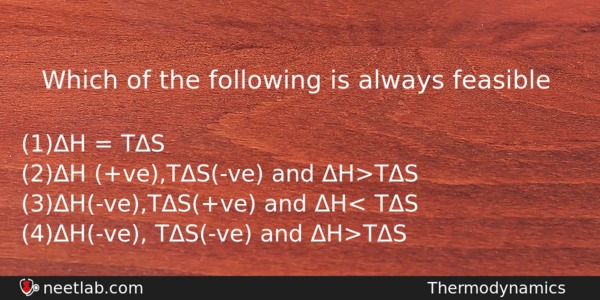| ⇦ | 
| ⇨ |
Which of the following is always feasible
Options
(a) ΔH = TΔS
(b) ΔH (+ve),TΔS(-ve) and ΔH>TΔS
(c) ΔH(-ve),TΔS(+ve) and ΔH< TΔS
(d) ΔH(-ve), TΔS(-ve) and ΔH>TΔS
Correct Answer:
ΔH(-ve),TΔS(+ve) and ΔH< TΔS
Explanation:
No explanation available. Be the first to write the explanation for this question by commenting below.
Related Questions: - An ideal gas at constant temperature and pressure expands and its
- In liquid-gas equilibrium,the pressure of vapours above the liquid is constant
- Biodegradable polymer which can be produced from glycine and aminocapronic acid is
- Among the following , the one which reacts most readily with ethanol is
- In which one of the following is not a buffer solution
Topics: Thermodynamics
(179)
Subject: Chemistry
(2512)
Important MCQs Based on Medical Entrance Examinations To Improve Your NEET Score
- An ideal gas at constant temperature and pressure expands and its
- In liquid-gas equilibrium,the pressure of vapours above the liquid is constant
- Biodegradable polymer which can be produced from glycine and aminocapronic acid is
- Among the following , the one which reacts most readily with ethanol is
- In which one of the following is not a buffer solution
Topics: Thermodynamics (179)
Subject: Chemistry (2512)
Important MCQs Based on Medical Entrance Examinations To Improve Your NEET Score
18000+ students are using NEETLab to improve their score. What about you?
Solve Previous Year MCQs, Mock Tests, Topicwise Practice Tests, Identify Weak Topics, Formula Flash cards and much more is available in NEETLab Android App to improve your NEET score.
Share this page with your friends

Leave a Reply